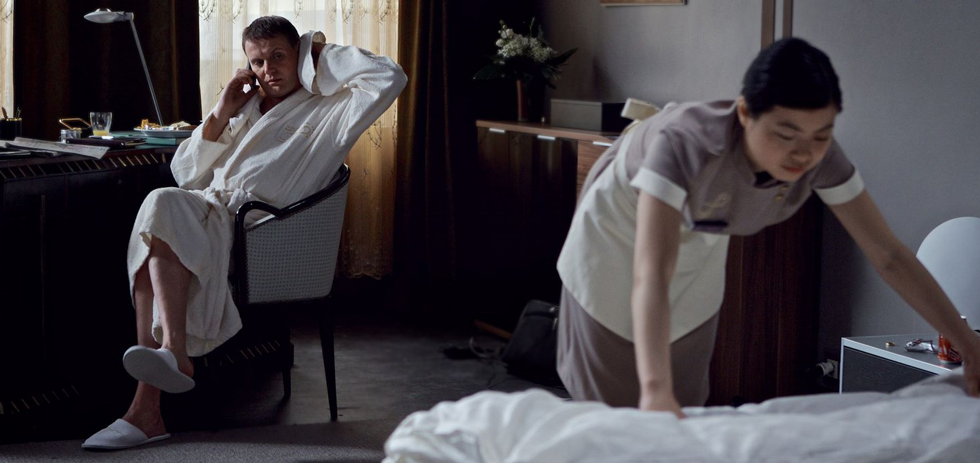
It’s always off-putting to have a film ostensibly billed as a comedy be unable to draw laughter for almost its entire runtime. Aside for one scene of physical comedy involving the packing of a suitcase, Johannes Naber’s Age of Cannibals is a joyless trudge through a misguided critique of capitalism; a satire lacking wit, intelligence or humour and instead packed with offensive racial and religious comments that it fails to fully distinguish as the thoughts of its characters alone.
A script courtesy of Stefan Weigl introduces us to our caricatures, Frank (Devid Striesow), a bigot whose distance from his wife and ill son causes him to ever be on the verge of a breakdown, and Kai (Sebastian Blomberg), vain, attachment free and fixated on efficiency and hotel cleanliness (especially when it allows the film to make broad cultural swipes, like a scene in which Kai gets all of the Nigerian hotel staff to look for a mosquito that stung him because he might have gotten Malaria). Both men work as ‘consultants’, essentially a contract lawyer and/or negotiator by a different name, for The Company, a multinational firm that works on behalf of major corporations in securing manufacturing deals across the world. When they are both passed over for a promotion to partnership in favour of their colleague Hellinger, resentment builds, and is oft-taken out on the people around them, including their new work partner Bianca (Katharina Schuettler). Once word reaches them of Hellinger’s sudden and mysterious death, they find themselves fearing the corporate structure they have loyally served.
As a corporate satire, Age of Cannibals is a scatterbrained package, unsure exactly what elements of the business world to aim at. It touches on some genuinely interesting ideas – homogenisation of business locations, sexual harassment, the conflation of protection and confinement (both financially and physically) – but it does so very little with any of them. The visual schema of the film sees every city skyline look the same – grey concrete slabs passing off as buildings – and every hotel hardly different from the one before. Whilst this does raise an interesting notion of multinational business making each country merely the embodiment of a dollar number rather than physical place, the film distinguishes each location in a really lazy way – through the skin colour of the hotel staff and the sounds that can be heard from outside the hotel; constant explosions and gunfire are supposed to make us aware the trio is in Nigeria. Also in its setting it only half-heartedly plays with the idea of a capitalist future; the Indian city they find themselves in has demolished the remnants of their old city for a shopping mall and now has public executions, yet outside that there’s no other indication of mass change, particularly in how often the film comes back to ‘jokes’ about the Taliban and terrorism; there’s a late joke about suicide bombers that feels like a feeble piece of ‘edgy’ political humour from over a decade ago.
Its failure as a black comedy, then, is where the film really puts its foot in its mouth over and over again, lacking incisive wit its offensive barbs fall completely flat and play as literal statements; Chinese businessmen are referred to as “chinks”, Frank explains the reason for gunfire outside as “some headscarf girl didn’t pass her virginity test”. These flippant cultural assertions aren’t confined to the main characters either, and its perhaps here that the film really makes a misstep, as in a scene where an Indian businessman who Frank and Kai take a contract away from refers to Pakistanis as “untermenschen” and then informs the German duo that Hindus make good workers because you can punish them and they will always feel that they deserve it. It’s almost as if Naber and Weigl write off every characters racial hostility as merely being an element of corrosive capitalism, despite not really showing us any of the other mass faults of the system outside of uncompassionate business dealings. The racism and sexism entrenched in dialogue isn’t left unmentioned, though, as the male writer and male director have the only named female character in the film act as the ‘voice of reason’, though whenever Bianca rebukes Frank and Kai for their actions or language, the film swiftly moves on, as if a glimmer of self-awareness is enough to make the dialogue clearly a series of controversial jokes.
Outside of that, it’s just a slog to sit through, a dull 90-minutes of which the broad strokes of plot are the changing contractual dealings of a major corporation, with every scene bookended by a fade to black and sinister music, an initially interesting conceit for tension-building that becomes entirely grating, having the opposite effect of a similar device seen in a successful hotel-set black comedy, Force Majeure. The plot points revolve around promotions and demotions, mergers and dissolutions, and there’s absolutely no engaging drama wrought from these ideas. A scene in which all three characters get drunk and discuss their original life goals is at once a ham-fisted insertion of actual characterisation but also once more a blurring of the film’s satirical intentions, having set up these characters as hollowed out representatives of money-lust only to assert, but not actually demonstrate, that the allure of The Company ruined them all.
Age of Cannibals ends as an assertion of being a corporate satire, though in practice it finds itself stuck between an unfunny comedy and an uncompelling character study. Perhaps more than all of that, the film is simply a waste of time.
